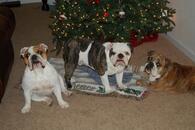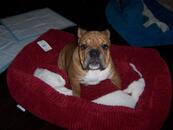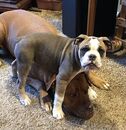Hello,
We have a 2.5 year old English Bulldog that has been recently diagnosed, via x-ray, with a 1cm bladder stone. We (the vet) has determined that his PH is alkaline so their educated guess is that it's a Struvite stone.
We would like to avoid surgery and would rather dissolve the stone with diet. Our biggest concern is the stone becoming lodged in the urethra.
Can anyone provided details regarding blocked urinary tracks and size of stones?
thanks so much!
We have already again sooo much info reading other bulldog owners stories on this message board and we hope to share our experience as we progress with this issue.
Jason
We have a 2.5 year old English Bulldog that has been recently diagnosed, via x-ray, with a 1cm bladder stone. We (the vet) has determined that his PH is alkaline so their educated guess is that it's a Struvite stone.
We would like to avoid surgery and would rather dissolve the stone with diet. Our biggest concern is the stone becoming lodged in the urethra.
Can anyone provided details regarding blocked urinary tracks and size of stones?
thanks so much!
We have already again sooo much info reading other bulldog owners stories on this message board and we hope to share our experience as we progress with this issue.
Jason
 Please let us know how everything progresses - you are correct that your story can help others.
Please let us know how everything progresses - you are correct that your story can help others.





